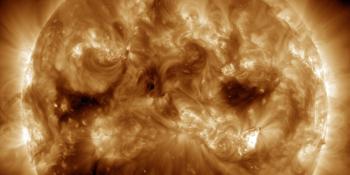Viewing archive of Tuesday, 14 September 2004
Solar activity report
Any mentioned solar flare in this report has a scaling factor applied by the Space Weather Prediction Center (SWPC). Because of the SWPC scaling factor, solar flares are reported as 42% smaller than for the science quality data. The scaling factor has been removed from our archived solar flare data to reflect the true physical units.
Report of Solar-Geophysical Activity 2004 Sep 14 2300 UTCPrepared by the NOAA © SWPC and processed by SpaceWeatherLive.com
Joint USAF/NOAA Report of Solar and Geophysical Activity
SDF Number 258 Issued at 2200Z on 14 Sep 2004IA. Analysis of Solar Active Regions and Activity from 13-2100Z to 14-2100Z Solar activity has been moderate. Region 672 (N05E10)
produced several C-class flares and a long-duration M1.5/1f at 0930
UTC. A Type II radio sweep (1018 km/s) and a Type IV sweep was
observed in association with the M flare. An associated CME most
likely occurred, but could not be confirmed due to a LASCO data gap.
Surging and plage fluctuations were observed in Region 672, which is
now in a beta-delta magnetic configuration. No new regions were
numbered today.
IB. Solar Activity Forecast
Solar activity is expected to be low
to moderate. Region 672 is expected to produce C- class flares, and
may produce isolated M-class flares.
IIA. Geophysical Activity Summary 13-2100Z to 14-2100Z
The geomagnetic field has been unsettled to active. Lingering
effects of the CME which arrived on 13 September led to persistent
active conditions early in the period. The greater than 10 MeV
protons have been steadily delining since reaching a maximum of 273
pfu at 14/0005 UTC, and are currently at 17 pfu.
IIB. Geophysical Activity Forecast
The geomagnetic field is
expected to be quiet to unsettled on 15 September as the effects of
the current disturbance subside. A CME originating from the M1.5
flare observed today may interact with Earth's geomagnetic field
beginning midday on 16 September, and lasting through 17 September.
Predominantly active conditions, with isolated minor or major
storming, is likely on 16-17 September as a result of this CME
arrival. The greater than 10 MeV Proton levels may increase as well
in association with a CME shock arrival.
III. Event Probabilities 15 Sep to 17 Sep
| Class M | 25% | 25% | 25% |
| Class X | 05% | 05% | 05% |
| Proton | 99% | 10% | 10% |
| PCAF | Yellow | ||
IV. Penticton 10.7 cm Flux
Observed 14 Sep 115 Predicted 15 Sep-17 Sep 115/115/110 90 Day Mean 14 Sep 112
V. Geomagnetic A Indices
Observed Afr/Ap 13 Sep 005/008 Estimated Afr/Ap 14 Sep 020/030 Predicted Afr/Ap 15 Sep-17 Sep 015/015-020/025-020/025
VI. Geomagnetic Activity Probabilities 15 Sep to 17 Sep
| A. Middle Latitudes | |||
|---|---|---|---|
| Active | 30% | 40% | 40% |
| Minor storm | 20% | 25% | 25% |
| Major-severe storm | 01% | 01% | 01% |
| B. High Latitudes | |||
|---|---|---|---|
| Active | 35% | 35% | 35% |
| Minor storm | 25% | 30% | 30% |
| Major-severe storm | 01% | 05% | 05% |
All times in UTC
Latest news
Latest forum messages
AR4048 81Unspecified geomagnetic activity 2177We are launching a dating app! SpaceWeatherLove! Download it today! 6AR4046 151Deep Flare Net 2
More topicsSupport SpaceWeatherLive.com!
A lot of people come to SpaceWeatherLive to follow the Sun's activity or if there is aurora to be seen, but with more traffic comes higher server costs. Consider a donation if you enjoy SpaceWeatherLive so we can keep the website online!

Space weather facts
| Last X-flare | 2025/03/28 | X1.1 |
| Last M-flare | 2025/04/01 | M2.4 |
| Last geomagnetic storm | 2025/03/27 | Kp5 (G1) |
| Spotless days | |
|---|---|
| Last spotless day | 2022/06/08 |
| Monthly mean Sunspot Number | |
|---|---|
| February 2025 | 154.6 +17.6 |
| Last 30 days | 128.1 -22.5 |


